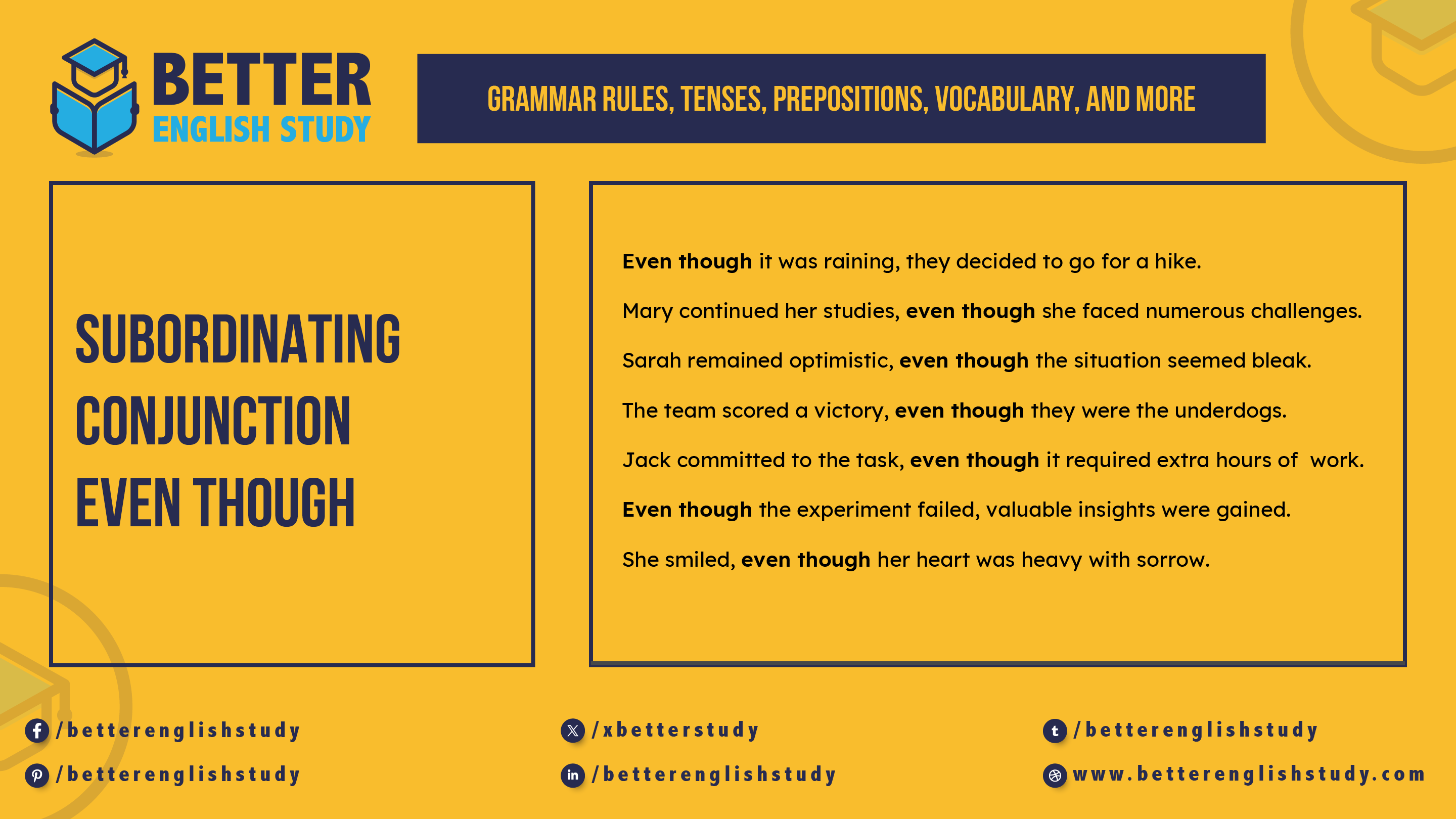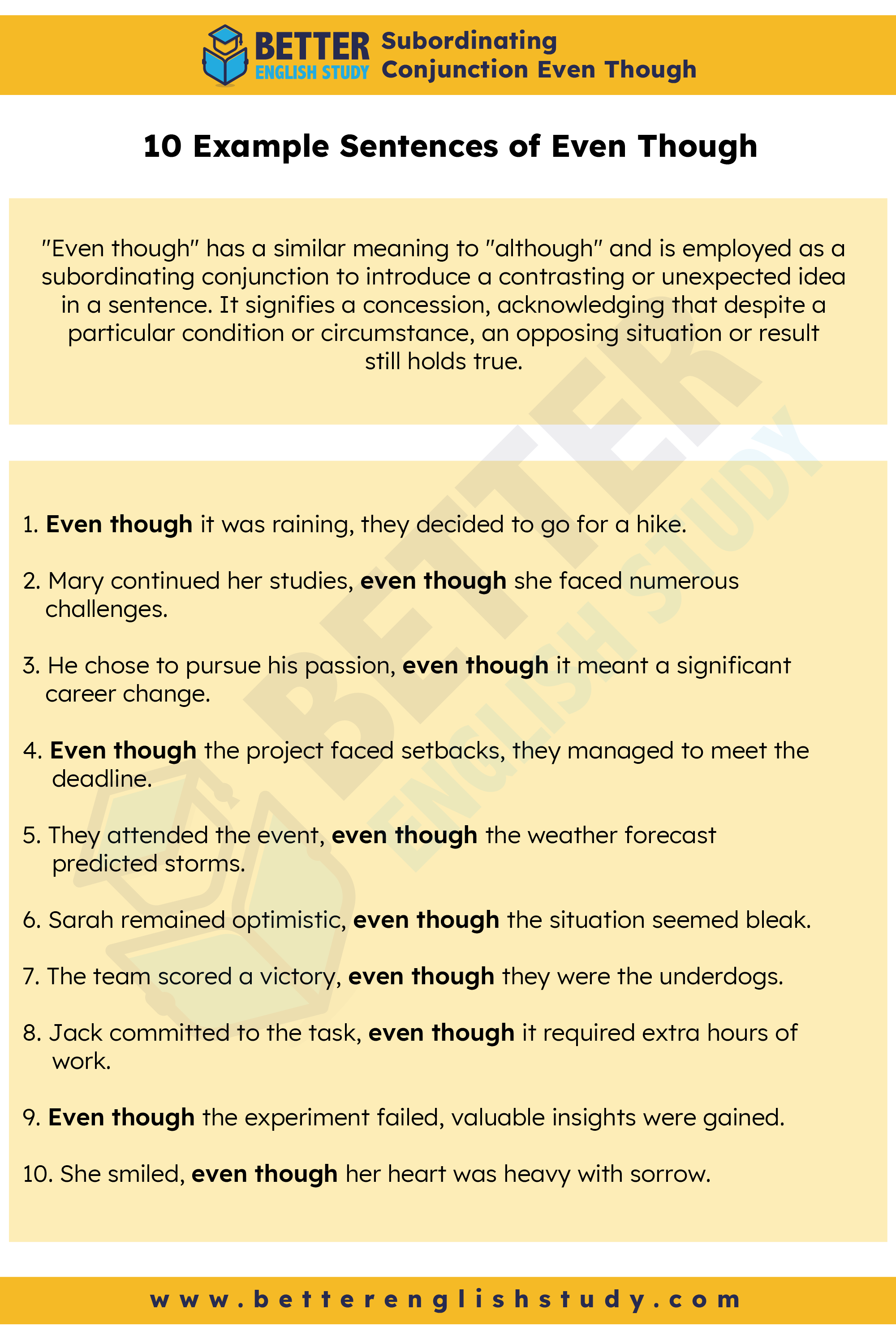
In the vast landscape of English grammar, subordinating conjunctions play a crucial role in connecting clauses and expressing complex relationships between ideas. “Even though” is one such subordinating conjunction that adds nuance to sentences by introducing a contrast or concession.
In this article, we will explore the usage of “even though” through example sentences, delve into its rules, and clarify common questions about its usage.
Use of Even Though in a Sentence
“Even though” has a similar meaning to “although” and is employed as a subordinating conjunction to introduce a contrasting or unexpected idea in a sentence. It signifies a concession, acknowledging that despite a particular condition or circumstance, an opposing situation or result still holds true.
10 Example Sentences of Even Though
- Even though it was raining, they decided to go for a hike.
- Mary continued her studies, even though she faced numerous challenges.
- He chose to pursue his passion, even though it meant a significant career change.
- Even though the project faced setbacks, they managed to meet the deadline.
- They attended the event, even though the weather forecast predicted storms.
- Sarah remained optimistic, even though the situation seemed bleak.
- The team scored a victory, even though they were the underdogs.
- Jack committed to the task, even though it required extra hours of work.
- Even though the experiment failed, valuable insights were gained.
- She smiled, even though her heart was heavy with sorrow.
What is the Rule of Even Though?
The rule of “even though” revolves around its use as a subordinating conjunction to introduce a contrast or concession. It is crucial to position it at the beginning of a subordinate (dependent) clause, emphasizing the unexpected or contradictory nature of the information it introduces.
Example:
- The team succeeded even though they faced numerous challenges.
Can You Start a Sentence with Even Though?
Yes, starting a sentence with “even though” is entirely correct. This subordinating conjunction is flexible in its placement, allowing it to initiate either the main or subordinate clause.
Examples:
- Even though the weather was unpredictable, they decided to have a picnic.
- They decided to have a picnic, even though the weather was unpredictable.
Although or Even Though – Which is Correct?
“Even though” and “although” are both correct and can be used interchangeably in many contexts. They have similar meanings and serve as subordinating conjunctions to introduce contrast or concession in a sentence.
The choice between them often depends on personal preference or the specific style of writing. However, keep in mind that “even though” is slightly more informal than “although.” Here are examples of both:
- Even though it was raining, they decided to go for a walk.
- Although it was raining, they decided to go for a walk.

Both sentences convey the same meaning and are grammatically correct. Choose the one that fits the tone and style of your writing.
Is It “Even When” or “Even Though”?
“Even though” and “even when” serve different purposes in a sentence. “Even though” introduces a contrast or concession, while “even when” suggests a recurring situation or a habitual action.
Examples:
- Even though it’s hot, she prefers wearing sweaters.
- Even when it’s hot, she prefers wearing sweaters.
“Even If” or “Even Though” – Which is Correct?
“Even if” and “even though” share a similar meaning and are often used interchangeably. However, “even if” is more commonly employed in situations where the outcome is uncertain or hypothetical.
Examples:
- She will attend the party even if she’s tired.
- She will attend the party even though she’s tired.
In conclusion, “even though” is a versatile subordinating conjunction that enhances the complexity of sentences by introducing contrasts or concessions. Understanding its use in various contexts, adhering to its positioning rules, and differentiating it from similar conjunctions contribute to effective and nuanced communication in English.
